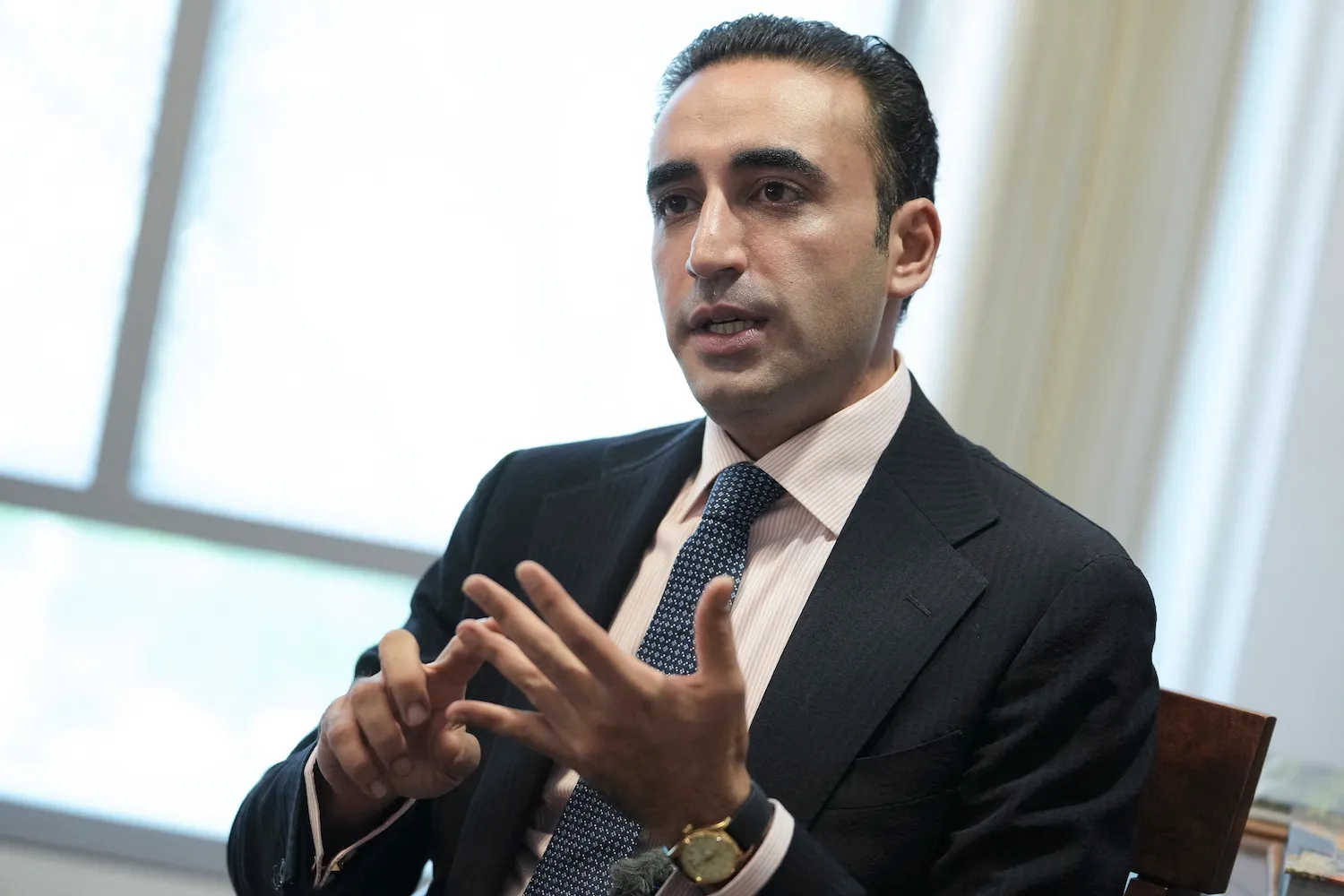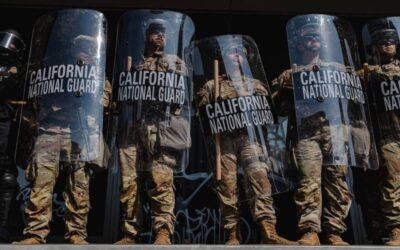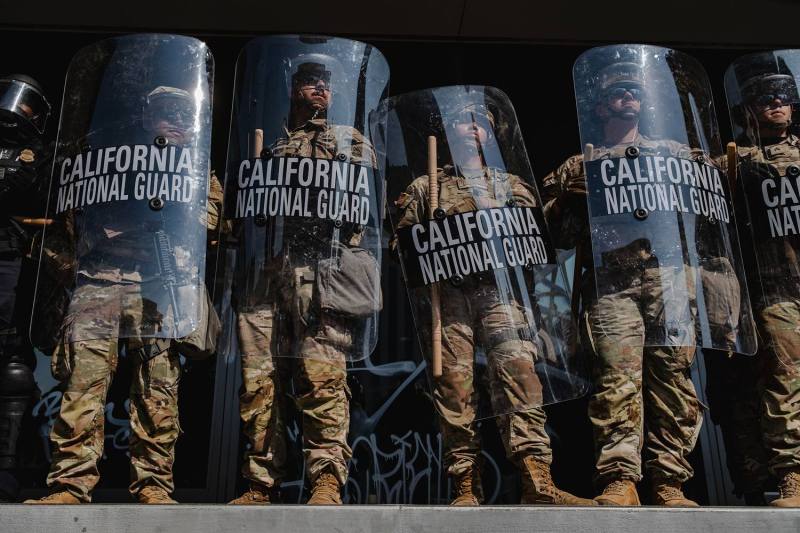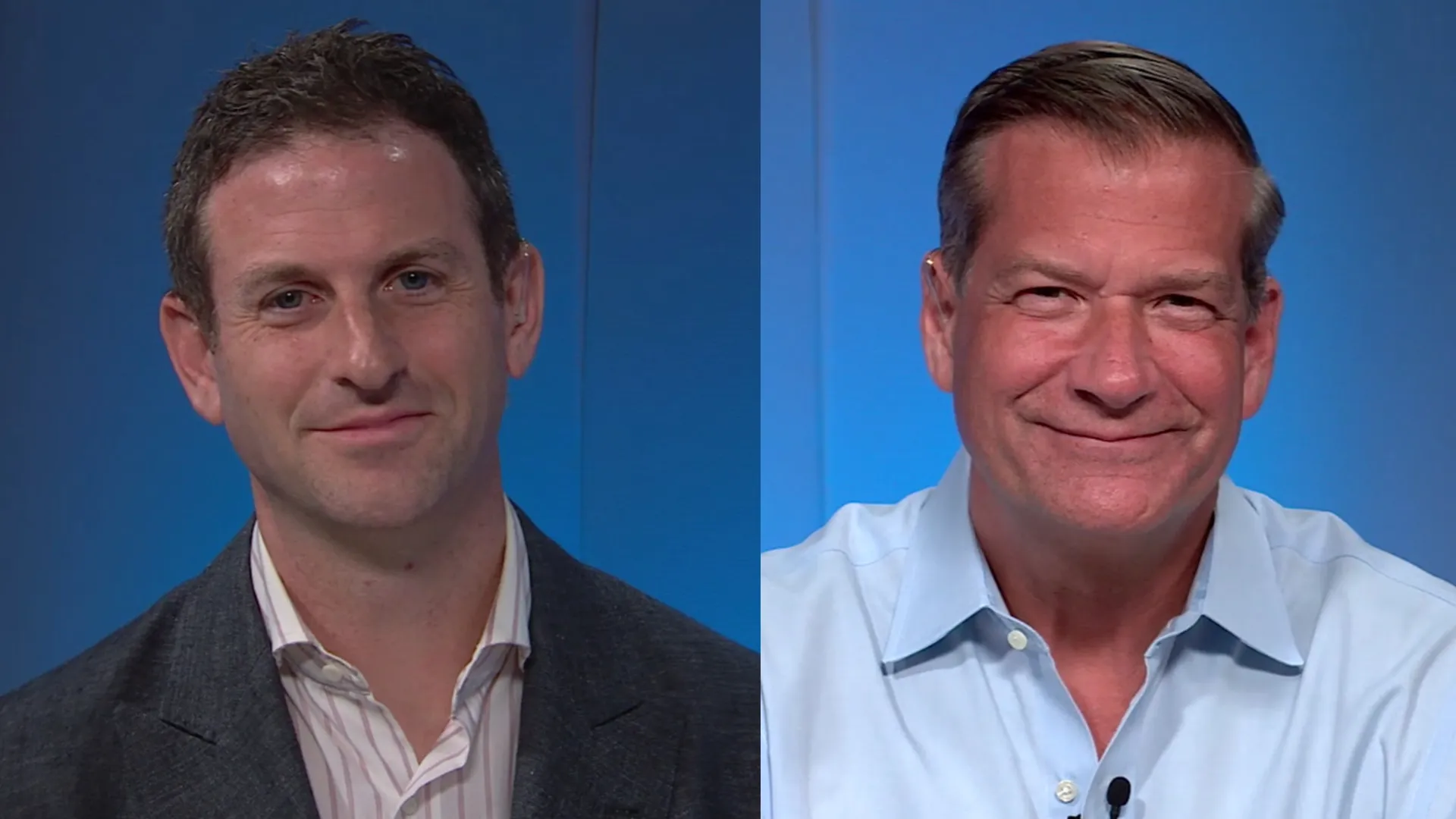‘We Have Changed as a Country’

‘We Have Changed as a Country’
Bilawal Bhutto Zardari says Pakistan cannot fight terrorism without talking to India.
Bilawal Bhutto Zardari, former foreign minister of Pakistan and current head of the Pakistan People’s Party, speaks during an interview with AFP at the Pakistani Embassy in Washington, D.C., on June 4. Oliver Contreras/AFP via Getty Images
Delegations from India and Pakistan spent last week in Washington, D.C., meeting lawmakers, officials, and members of their respective diasporas to communicate dueling messages that seem as intractable and incompatible as their decades-long conflict over the disputed region of Kashmir.
The Indian delegation, led by opposition lawmaker Shashi Tharoor, has said dialogue between India and Pakistan cannot take place unless the Pakistani government dismantles the terror groups emanating from its soil. The Pakistani delegation, led by Bilawal Bhutto Zardari, said Pakistan cannot effectively combat terrorism without dialogue and cooperation with India.
Delegations from India and Pakistan spent last week in Washington, D.C., meeting lawmakers, officials, and members of their respective diasporas to communicate dueling messages that seem as intractable and incompatible as their decades-long conflict over the disputed region of Kashmir.
The Indian delegation, led by opposition lawmaker Shashi Tharoor, has said dialogue between India and Pakistan cannot take place unless the Pakistani government dismantles the terror groups emanating from its soil. The Pakistani delegation, led by Bilawal Bhutto Zardari, said Pakistan cannot effectively combat terrorism without dialogue and cooperation with India.
The competing delegations were dispatched after the latest conflict between the two nuclear-armed neighbors: a terror attack in the town of Pahalgam in Indian-controlled Kashmir that killed more than two dozen people, followed by a four-day armed conflict that ended with a cease-fire—the latest of many in their history—on May 10. India accuses Pakistan of engineering the attack, while Pakistan has denied any involvement.
Foreign Policy spoke to Bhutto Zardari—a former Pakistani foreign minister and the son of two Pakistani leaders, including his mother, Benazir Bhutto, who was assassinated in 2007—at the end of his U.S. visit last Friday. We discussed Pakistan’s relationship with terrorism, its military’s historic role in supporting regional terror groups, and his desire for dialogue with India.
The conversation has been edited for length and clarity.
Foreign Policy: Your delegation and the Indian delegation are here at the same time sharing your respective messages. A lot of the conversation has been around evidence—specifically, what evidence India has that Pakistan was behind the Pahalgam attack. The Indian delegation was asked about it, and they’ve said that none of their interlocutors have asked for evidence and that Pakistan’s support for terrorist groups is well-documented over several decades. So I want to get your reaction to that—have you felt any burden of proof on this trip, given that historical context?
Bilawal Bhutto Zardari: Not only have we not faced questions, but people we have engaged with have concurred with Pakistan’s position that we were not involved in this terrorist attack. Intelligence agencies of the United States and other countries concur with Pakistan’s position that we had nothing to do with this attack. I think if the U.S. intelligence agencies’ assessment was that we had something to do with this attack, you would see that reflected in the American position, which it is not.
After this attack, immediately, the prime minister of Pakistan offered an independent, impartial international inquiry, because our hands were clean. We are certain we had nothing to do with this terrorist attack.
As far as terrorist groups and their past, Pakistan today is not the Pakistan that the Indian delegation or the Indian media or the Indian government describe—we’re not that caricature that they tried to paint for us, be it our political leadership or our military leadership.
We’ve all come up fighting these terrorists. From the political aspect, we fight them on the political page, we call them out, we challenge them, and as a result, we’ve paid the price in blood, in lives, including my mother. On the military side, the military leadership that we have in Pakistan today have come up the ranks fighting these terrorists.
As far as the groups of concern for India, we just went through a rigorous FATF [Financial Action Task Force] process where we proved before an international forum that we’ve taken concrete action to dismantle these organizations. We’ve taken close to 900 buildings, institutions back from these organizations. We’ve arrested their leadership, we’ve disarmed their rank and file. They no longer resist as they once did.
If the Indian government had any proof of Pakistani involvement, they would have shared it with us, they would have shared it with you, they would have shared it with the Indian public. They would have shared it with the media. To this day, they’re unable to name one person that was involved in this attack, if they did in fact come over from Pakistan. It’s the age of modern technology and satellites, and it’s one of the most militarized zones in the world. They’ll be able to tell us exactly, especially two months on, at what border crossing, from what town did they enter, where did they go to. That information has not been provided today.
The reality of the situation is this was an internal security lapse for India. The terrorists involved, according to our intelligence, according to our suspicions, were local individuals that were involved in these attacks. In order to deflect from that, India decided to launch a full armed conflict. I’m sure we can all agree that despite the cease-fire, despite how much we welcome the cease-fire, that the world is a lot less safe today than it was then.
As things stand, the new normal—or new abnormal, as we call it—that India wants to impose on the region is if there’s a terrorist attack anywhere within India or anywhere within Indian-occupied Kashmir, proof or no proof, that means war with Pakistan. And the law of reciprocity means that if there’s a terrorist attack in Pakistan, proof or no proof, want to or not want to, we have to go to war with India.
That is a dangerous, dangerous position. It is not a position that any rational, reasonable, responsible state will adopt. And we’re hoping this sort of fever will break in India, that they’ll come back to their senses and take policy decisions that will result in a more safe and stable environment for their people and for ours.
FP: So can you categorically say that this is a break with past precedent, and that the Pakistani government, military, and intelligence services absolutely do not support any or foster any of these terrorist groups?
BBZ: I would argue even in past instances when terrorist groups conducted attacks, or people were motivated for one reason or another to conduct an attack, it was often to sabotage government policy, our political policy or military policy. And if you correlate these attacks, you’ll see that they correlate exactly with every time Pakistan is having a dialogue or a peace process with India; in the middle we find that some such group has conducted the attack. What’s different today is we have gone through the rigorous FATF process and clamped down not only to our own standards, but to international standards against these organizations.
Having said that, terrorism is still a challenge today. At the moment, we are just dealing with the consequences of what happened after [the Soviet-Afghan War in the 1970s and 1980s], where you had these religiously minded groups pop up all over the place. They were first involved in the Afghan jihad, [and then after,] having nothing to do, they either set up shop to attack us or they set up shop to attack India, to attack some other country.
The real threat I see vis-à-vis terrorism today is what’s going to happen post-[the U.S.-Afghan War from 2001 to 2021], because we at the moment are feeling the brunt in Pakistan of an exponential increase in terrorist activity. Attacks have increased exponentially, to the point that the rate of terror in Pakistan today makes it the bloodiest year in Pakistan’s history.
And this is a new wave of terrorism. These disparate groups, the BLA [Balochistan Liberation Army] and the TTP [Tehreek-e-Taliban Pakistan], don’t have anything ideologically in common. In the past, they operated independently. Post the fall of Kabul, [because of] the vacuum that’s been left behind over there [and] the ability for various groups to operate with a degree of independence as a result, now we see them cooperating. So, if today I see in Pakistan two disparate groups cooperating, it’s not much of a stretch of an imagination that other groups will tomorrow also start cooperating.
I believe we as a region and the international community are actually not paying enough attention to this issue. When India politicizes the issue of terrorism, it actually undermines our ability to tackle this problem.
If India and Pakistan have a comprehensive dialogue, I’m hopeful that as part of that comprehensive dialogue, we can have a conversation around terrorism, discuss intelligence sharing. I mean, you stop terrorist attacks in capitals across the world—whether it’s New York, whether it’s London, whether it’s Paris—through intelligence sharing.
[For] countries like India and Pakistan, who have genuine terrorist concerns, it makes absolutely no sense that since 2012 we haven’t had a comprehensive dialogue. The last time in 2019 this incident happened, which resulted in planes in the air. This time, it was worse, but between 2019 and 2025, we also have had no conversations. So for people like me who want to face the challenge of terrorism, I believe the approach that we’re taking right now, where we’re not talking to each other and we’re politicizing the issue of terrorism, that undermines the genuine effort that needs to be taken to counter these groups.
FP: But India says dialogue has happened in the past—the Pakistani foreign minister was in India during the 26/11 attacks [in Mumbai] in 2008, there have been offers for Pakistan to join investigations on past attacks that have gone nowhere, and even the United States has spoken out about Pakistan’s support for these terror groups. What is different this time, and why should people believe you?
BBZ: So as far as dialogue in the past not working, just because we have been unable to achieve peace, it doesn’t mean that we should stop trying to achieve peace. I would argue that the terrorist attacks do correlate with peace efforts. The point of the terrorist, the purpose of the terrorism, is to sabotage those peace talks, and we play into the terrorists’ hands when we fall into these traps.
As far as this accusation that investigations have gone nowhere, the actual position on the ground is that our investigations and our criminal cases against these elements that we’re conducting ourselves have gone somewhere. They resulted in conclusions, in convictions, and we’ve arrested these individuals. The specific India-related cases are frustrated because India refuses to cooperate with Pakistan and Pakistani courts. Surely, that’s a policy that they should review.
Pakistan has convicted these individuals in the terror financing cases, in other cases that we’ve brought against them. There are other cases that are to do with the Indian accusations; those cases can only make progress if the necessary witnesses, documents, [and] legal elements are followed within the Pakistani context.
So I think this is a bit of purposeful disinformation or misinformation for India to say that all those cases haven’t gone anywhere, when they know very well that they haven’t cooperated with the Pakistani courts and the Pakistani investigations.
FP: You mentioned the military as well. You’ve come here talking about the need for dialogue and the need for peace. At the same time, there’s been a surge of public support for the Pakistani military following this conflict. Army Chief of Staff Asim Munir gave a speech many have described as incendiary days before the attack, saying that Hinduism and Islam are not compatible culturally. And there’s been an escalation in nationalistic fervor on both sides. How do you square that sort of nationalism and military with your message of a dialogue and peace? Aren’t those at odds?
BBZ: It’s a very valid question. They’re absolutely not at odds with each other. I think that the chief’s speech was taken out of context. The context in which that speech was given was that we just had the Jaffar Express terrorist attack in Balochistan, conducted by the Baloch Liberation Army and the Majid Brigade—that we presented proof time and time again is supported by India.
As far as Hinduism being compatible with Islam, again, I believe that comment is taken out of context as part of the historical arguments for partition. These sort of arguments were made about the need, particularly in an Indian-majority country, for the Muslims to have a country of their own, and I believe much of the [right-wing Hindu nationalist] RSS [Rashtriya Swayamsevak Sangh] politics and BJP [Bharatiya Janata Party] politics that has sprung up recently [in India] has sort of gone on to justify the decisions and actions that were taken at the time.
As far as Hinduism and Islam being compatible, I come from the province of Sindh. We have the largest percentage of Hindus in Pakistan, we live side by side. I actually pride myself on the number of Hindu Pakistanis that represent my party both at the provincial level and at the federal level.
I wish the [Indian Prime Minister Narendra] Modi government could say the same, I wish the BJP could say the same. I know that there are Indian Muslims that do get elected to parliament, but they’re not associated with the BJP.
All of these points aside, I believe, and the government of Pakistan believes, that in order to address our issues, we must have a dialogue and diplomacy in pursuit of peace. If we think that the only way to solve terrorism is to go to war between India and Pakistan, the way to solve Kashmir is to go to war between India and Pakistan, the way to sort out water disputes is to go to war between India and Pakistan, none of those issues are going to get resolved. Our security environment is going to deteriorate [and] the future of South Asia looks bleak. So I think that Pakistan’s case for peace is an important one to make, and we’re doing so passionately.
FP: Is the military fully behind that message of wanting dialogue?
BBZ: Absolutely. We’ve seen a military victory during this conflict. The military has demonstrated throughout the conflict their ability to show restraint and not to escalate in various instances where they could have done. The message absolutely is that we want peace.
Of course, Pakistan isn’t desperate for peace in the sense that if we’re going to keep going around and the other party is going to say that we don’t want it, we’re not going to talk, and finally we won’t. I believe that the politicians have to create that space. There’s challenging politics in Pakistan, there’s challenging politics in India, there will be voices that will eat away at this desire for peace.
And I think that this is the first time after 2019 that the political leadership and obviously the military leadership are all talking about peace on the Pakistani side.
It’s our position that we agreed to the cease-fire under the condition that we would talk on a neutral territory [and] discuss all friction points. [U.S.] Secretary [of State Marco] Rubio, who’s part of this conversation, made the public statements to that end at the time. If we don’t take advantage of the situation, if we continue to not talk to each other and we insist that we’re going to be the only two nuclear-armed states that have no dispute resolution mechanism, [if] we don’t accept the United Nations, we don’t accept international law, we don’t accept the Indus Waters Treaty, we don’t accept [U.S. President Donald] Trump’s mediation, we don’t accept dialogue, then we’re damned to our fate, and we’ll deserve it.
I’m from a much younger generation. I think it’s a lot easier for some of these politicians to talk war and not have to deal with the consequences. My generation are going to have to pick up the pieces of any conflict. We have far greater challenges to face. I believe that climate change, water scarcity, poverty, [and] a whole host of issues can be tackled if we work together with India.
I hold no ill will to the people of India, to the youth of India. I refuse to damn my people generation after generation to conflict, and I refuse to damn the people of India generation after generation to conflict. I think it takes a coward to go to war, and it takes a brave man to make peace, and we’re going to continue to pitch this case and appeal to the international community to assist us in this pursuit.
FP: Should another conflict happen, are you confident that if the Pakistani military has a different goal to the civilian government, that the civilian government will be able to restrain the military?
BBZ: Pakistan has had a complicated history, and as part of our history we’ve seen manifestations of this. But at the point we are now, we don’t have that problem.
Currently, whether it’s the political, military, or bureaucratic leadership, we’re not the same as then. In the early 2000s, whether it was the rank and file of the military or it was the rank and file of the majority—other than Benazir Bhutto and the People’s Party of the political class—they came up over time when jihad and the mujahideen in Afghanistan was painted as the right thing to do. They worked with these people, they fought with these people, they achieved whatever they had to achieve in [the Soviet-Afghan War]. So, in that context, you could understand that they had mixed feelings for individuals in the various areas.
At the moment, every political party has been targeted by terrorists. The military leadership is not made up of the old military hands or the old intelligence hands that used to work with these forces in Afghanistan at the behest of the West and others. The military leadership and intelligence leadership today have come up fighting these people in Waziristan, so it’s ingrained in us that this is the enemy—not because of India, not because of America, [but] for our own reasons. There are challenges, complications, and that’s sort of a detailed discussion. But this perception, the framing of your question, is based on an understanding or a context of where Pakistan was at in the past.
We have changed as a country—again, not as a result of some sort of external pressure, some sort of lever, the collective actions of the world—we’ve changed for our own survival. And today, while we’re still being asked questions about the past, we’re dealing with a new reality, a new terrorist threat that I’m concerned that the international community is not quite cognizant of. The terrorism that we experience today in Pakistan on a daily basis is now the byproduct of [the U.S.-Afghan War]. I’m genuinely concerned the international community continues to ignore the vacuum they created in Afghanistan. If the international community does not step up their own international cooperation [and] regional cooperation to take on this menace, then tomorrow not only Pakistan will be facing the consequences, but the international community will also face those consequences.
FP: You mentioned earlier the terrorist attack in India was “internal,” but the Indian delegation said that two of the attackers came from Pakistan and two were exfiltrated from Kashmir to Pakistan.
BBZ: But rather than talk in theory, especially now that we’re two months on, that’s the sort of information that if it was legitimate, you would have provided before an attack. Even now, if it does exist, surely the names, the exact locations where they came from, how they got in, where they got to, how they got out, where are they today—all of that would have been presented to the Indian public, to the Indian media, to the international community, to their allies internationally, and to Pakistan as a chargesheet, that these are these guys, this is where we found them, this is where they came from. The fact of the matter is the Indian government is lying to you, it is lying to their allies, and it’s lying to their public.
They refuse to admit that their jets were downed. They still refuse to admit how many jets were downed. They also are unable to tell us the name of a single so-called terrorist they supposedly targeted in Pakistan, because if you recall, we were told they were targeting terrorist infrastructure. It’s Pakistan’s position that they targeted civilian infrastructure. It’s Pakistan’s position that they killed innocent civilians whose names we can name, whose pictures we can share, who we can identify.
They can’t even identify a single terrorist that they attacked in their so-called operation, whatever the operation is called. My point is that credibility and transparency are incredibly important in the modern world. The Indian government does not have the credibility or the transparency, it was not available during this operation. They relied on disinformation during this war, the Indian media relied on disinformation during this conflict. And now, this delegation that’s come here is also relying on disinformation.
I can take action against terrorist groups, I can take actions against individuals, even, heaven forbid, if they were cross-border, but I need to know who they are. I need to be told exactly where they came from. You can’t just sort of scream “terrorists” and expect all of us to believe, because we’re Muslims, therefore we’re all the same. It may be how it works in Gujarat, but it doesn’t work like that internationally, and that’s the pushback the Indian government is seeing.
Even according to international law, there’s legal ways to go about this, right? So had there been a cross-border terrorist attack, it doesn’t mean that India is independent from international law, the confines of it. They should have gone to the United Nations, made their case like the United States did after 9/11, and the whole world would have rallied around them. But they can’t, on the basis of a lie to cover up internal security failures, launch an attack against Pakistan and expect us to feel guilty about it.
What they’ve done through their own petty politics has actually left the people of Pakistan and the people of India less safe, not only because it’s handicapping our ability to tackle terror. If they refuse to talk to us, that’ll also handicap our joint ability to tackle the issue of terror. They’ve lowered the threshold for full-out military conflict between our two countries to a degree that it’s never been at before in our history. The escalation ladder, we saw how fast it went up this time around.
If the purpose of this operation was to target terrorists, they’re unable to name a single terrorist that they targeted. If the purpose was to create a safer India for their people, they’ve created a less safe India. It’s not in their interest, it’s not in our interest, which is why we see ourselves as having a very different mission. Our mission is to try and convince India but also to engage the international community in this pursuit for peace.
FP: Since you’ve mentioned the Indian planes [that Pakistan allegedly downed], have you been asked during your trip for evidence of what Pakistan has claimed on that front?
BBZ: This is the age of tech, this is the age of satellites, this is the age of visibility. You don’t fire a missile without it having a record, an electronic signal. You don’t down a plane and expect people not to notice. Before even having to say anything, the conversation often starts with the amount of planes of the Indian Air Force that we shot down. Obviously, there’s interest in what tech we used, what planes we used to down their planes, but the starting point is the understanding that a significant number of planes were downed.
And there’s this feeling that the Indian government did not tell the truth to their allies, that they didn’t only hide the truth behind this terrorist attack when they were trying to galvanize support for this conflict. To this day they won’t speak the truth on the planes—wherever they go, and whenever they engage with people, if the issue of the planes is brought up, they deflect.
FP: But in the interest of the transparency that you’re talking about, why not make that information public from Pakistan’s side?
BBZ: We’ve provided the names of the planes, the names of the pilots flying those planes, the positions within Indian territory or Indian-controlled territory that they crashed in. All that information can be shared with you. I’ll get my team to follow up. For us, it’s not something that’s difficult to produce. The normal thing to acknowledge, though, would be for India to just tell the truth.
Ultimately, the planes didn’t fall in our territory. They fell in Indian territory. We have the geolocations, we have the specific names of pilots, the call signs, the hospitals where the ones that are still alive are being treated in, the ones that unfortunately passed away. That information can be shared, and it should have been shared with the Indian public by the Indian government.
FP: So to bring back and crystallize a lot of what we’re talking about, and your point that this time, it’s different. What is different about this time?
BBZ: It’s not just this time; Pakistan has been different for quite some time. And this is not the first time we’ve been falsely blamed for something that’s happened in India. The things that’s happened this time, is that international intelligence agencies are corroborating our view. Other people are not endorsing what India is saying.
As far as these other groups that you’re referring to, do you think that we in Pakistan sit over a stove and cook up these terrorist organizations for various things? No, we were left with the aftermath of [the Soviet-Afghan War]. After that war, all the groups, the mujahideen, these jihadists that we’ve [since] opposed, my mother would warn at the time—she warned the Americans, she warned the Pakistanis—that we’re creating a Frankenstein monster that we’re all going to have to live with. But we were told by [former U.S. President] Ronald Reagan that this is the moral equivalent to George Washington and that was sort of the framing of these groups at the time.
Then we have these other groups of concern, the LeT [Lashkar-e-Taiba] and LeJ [Lashkar-e-Jhangvi], where Pakistan is not only taking action to satisfy itself, not only taking action to satisfy the Indian government, we’ve done it under the auspices of the FATF, where we’ve painstakingly gone through and complied with what was required for us. We’ve gone above and beyond to deal with these groups.
If somebody else exists, if there’s someone we’re missing, if there’s some place that we’re lacking, we’d like that information shared with us. We’d like whichever country has this concern to cooperate with us so we can deal with that problem as well. That’s what’s changed on the ground today—history has moved on, context has moved on, events have taken over from this sort of perception everyone’s stuck in, where they were all paying attention to Afghanistan while [the U.S.-Afghan War] was going on, and they were trying to force us to target a particular group, and if they weren’t satisfied with the way we were targeting one group, then this impression was hyped up that Pakistan needs to do more.
We’re dealing with the reputational damage, but the ground reality in Pakistan is [that] today, we are taking these [groups] on. We would be far more effective in taking more action against groups that may be of concern to India if that intelligence was shared with us. All the knowledge we do have about concerning individuals, we have taken action against those people. And I believe it serves India’s interest to break this lock where they’re stuck in the past framing and move on.
Rishi Iyengar is a reporter at Foreign Policy. Bluesky: @iyengarish.bsky.social X: @Iyengarish Instagram: @iyengar.rishi
Stories Readers Liked
In Case You Missed It
A selection of paywall-free articles

Four Explanatory Models for Trump’s Chaos
It’s clear that the second Trump administration is aiming for change—not inertia—in U.S. foreign policy.
























Join the Conversation
Commenting is a benefit of a Foreign Policy subscription.
Subscribe
Subscribe
Already a subscriber?
.
View Comments
Join the Conversation
Join the conversation on this and other recent Foreign Policy articles when you subscribe now.
Subscribe
Subscribe
Not your account?
View Comments
Join the Conversation
Please follow our comment guidelines, stay on topic, and be civil, courteous, and respectful of others’ beliefs.
View Comments
Change your username |
Log out
Change your username:
CANCEL
Confirm your username to get started.
The default username below has been generated using the first name and last initial on your FP subscriber account. Usernames may be updated at any time and must not contain inappropriate or offensive language.